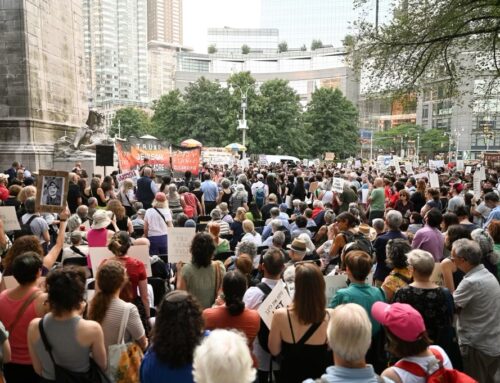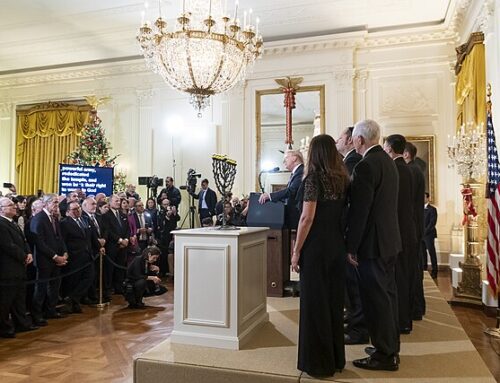Last Saturday night’s rally in Rabin Square, sponsored and organized by the Million Hands organization (http://www.millionhands.org.il/million-hands-english/), was dedicated to the theme of “Changing the Government” and hailed as the “event” of the electoral season; whether or not the large turnout of disgruntled Israelis will have any effect at the polls remains to be seen. Moreover, the organizers went to great lengths to emphasize that they do not endorse any one candidate for that role. Still, it was hard to ignore the overwhelming number of Zionist Union and Meretz paraphernalia, along with Peace Now, the Geneva Initiative, and various other organizations associated with the center-left and left.
This is hardly surprising; many on the right, not particularly enamored with Bibi, are unlikely to show up at a rally denouncing him (and make no mistake, this rally did just that), as he remains, contrary to what many may say, the strongest and most capable leader in the “national” camp. Other candidates, like Bennett, understand that no amount of bluster will aid them in reaching the Prime Minister’s Office–at least, not during this election cycle. Lest anyone was mistaken about whom the target was here, nearly every speech was interrupted multiple times by cries of “Bibi go home” and various other insults. One only need peruse through the international media’s headlines about the event to see how it was framed outside of Israel.
A major complaint of the left made throughout this campaign is the success that Bibi has had in turning the discussion away from burning issues like healthcare and housing, and harping on Iran.Yet, when one gleans over the subject matter covered by a number of speakers last night, one would deduce, sadly, that he had all but succeeded in this endeavor: most spoke about the security situation in the south, international isolation, the conflict with the Palestinians, and Bibi’s overarching failure to deal with any of these crises. To be fair, attempts at pointing out his shortcomings over his sacred cow of security is not without merit, if it means winning over voters who would normally vote for Likud. But by doing so, the organizers also missed a prime opportunity to hit Bibi where he’s most vulnerable.
Much has been said about keynote speaker and former Mossad head Meir Dagan’s speech, but I was less than impressed. This event was not the first time that Dagan has had the opportunity to rail against Netanyau’s policies, and nothing that he said here was particularly original or significant. We have heard from him, ad naseum, about the dangers of the occupation, the failure in leadership, and the future of a bi-national/apartheid that awaits us without a peace accord. He has given similar speeches to multiple media outlets and at conferences, that were just as heartfelt (I should note, by the way, that Dagan was also hard to hear, with a noticeably large group of people breaking into chatter during his speech out of boredom). While I certainly don’t mean to make light of the subject matter, Dagan, unfortunately, speaks in abstract terms; it is simply impossible for many Israelis to envision a day when the two-state solution will be no more, when their state is transformed into something unrecognizable, perhaps against their will. As such, it has become quite easy for Israelis of all stripes to ignore such threats, preferring instead to focus on more immediate concerns.

Meir Dagan addressing the crowd during last night’s event in Rabin Square
Far more effective were two speeches given by women, two personal, very powerful stories that resonated with me, long after the rally ended. The first, somewhat well known, was by Michal Kesten Keidar, widow of Dolev Keidar, a soldier killed during the war in Gaza this summer. Keidar recalled that her husband was a patriot who loved his country very much, and was killed in a war that could have been prevented. “We had plans to grow old together,” she exclaimed, “and now your daughter will grow up without a father”. Kesten Keidar, eerily enough, is also well-known for the documentary she produced dealing with the subject matter of her husband’s place in the army greatly affecting the lives of his family. The bitter irony of then losing him permanently to his work cannot be ignored. If her appearance at her husband’s funeral is any indication, she has some prior experience in giving profound and heartfelt speeches.
Ronit Havivian Katzir, a mother and resident of Sderot, and a member of the Movement for the Future of the Western Negev, spoke next about the desperation experienced on a daily basis in dealing with life under the threat of rockets. So terrible has the experience been for her children, she recalled, that during a trip to the United States, her son, upon landing, wanted to be certain that he was familiar with the English translation of ‘red alert’, the phrase heard during an alarm. She then confided in the audience that at one point, she too voted for Bibi, but never again: “we won’t let you use our desperation for your political gain”. Sderot, it should be noted, is historically a bastion of right-wing support, a fact reinforced by being the constant target of rocket attacks. Hearing Katzir denounce the Likud, then, is all the more powerful.
In total, between 40,000-50,000 people showed up at Rabin Square, hardly a miniscule number–more enthusiastic observers estimated double that number. Struggling through the crowd of people to leave the event, I noticed how groups of people spilled out of the square itself and into the streets. Social media sadly, was full of cynics, most of them on the left, who decried what they saw to be a lack of interest in the event. After all, 40,000 figure is only equal to about one mandate in the Knesset. And whose to say that, despite the enthusiasm, the momentum created would have any real effect on the election’s outcome? Yet a week and a half remains before the balloting, and as we’re constantly reminded, polls are notoriously fickle.




Erratum: This post had originally identified the organizational sponsor of the rally described here as V-15, rather than Million Hands. We regret the error.